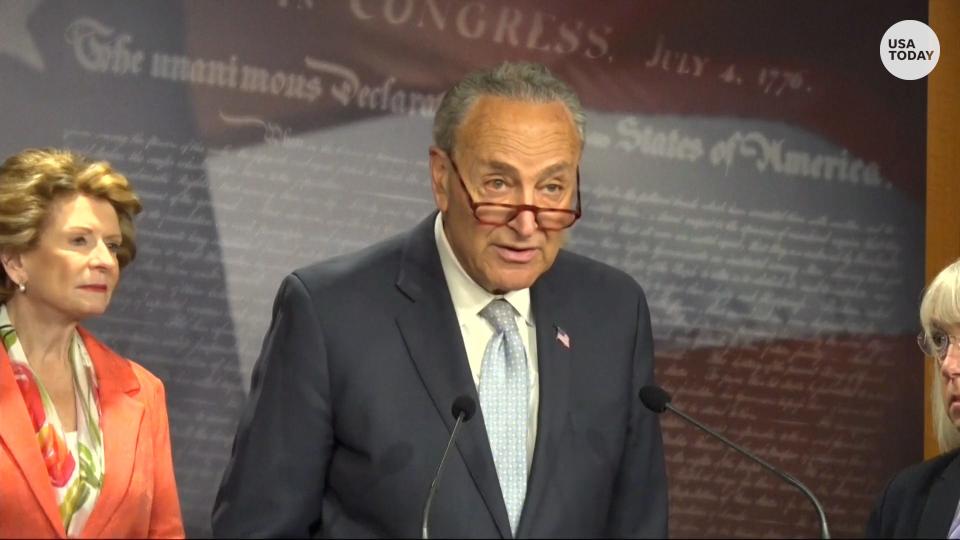Kansas senators oppose effort to make Roe v. Wade law of land amid Supreme Court firestorm
- Oops!Something went wrong.Please try again later.
Both Kansas senators voted Wednesday against a bill that would have made Roe v. Wade the law of the land, as the first legislative attempt to enshrine a national right to abortion since the leak of a draft Supreme Court opinion that would overturn the landmark decision came up short.
Democrats were unable to overcome a filibuster on the Women's Health Protection Act of 2022. The effort failed 49-51.
Sen. Joe Manchin, D-W.Va., joined every Republican in opposition, meaning the measure would have failed even if it had mustered the 60 votes needed to send the measure to the floor for an up-or-down vote.

In an unsurprising move, both of Kansas' members, U.S. Sens. Roger Marshall and Jerry Moran, voted against the bill.
Why was Roe v. Wade never codified in Congress? Democrats since Clinton 'kind of dropped it'
Republicans hit Democrats over Roe protests at justices' homes, calling them 'mob rule'
"While the overturning of Roe vs Wade simply returns this emotional issue to the states, to the elected voice of the people, this bill would invalidate any and all state laws that protect the unborn child and the health and well-being of the mom," Marshall said in a statement following the vote.
Echoing that sentiment, Moran called it the "most sweeping expansion of abortion access in our nations' history."
"Not only is this legislation immoral, it is far outside the mainstream of American opinion and would have placed the United States alongside China and North Korea as outliers with the world’s most permissive abortion laws," Moran said in a statement.

The bill was not expected to pass, but Majority Leader Chuck Schumer, D-N.Y., framed the vote as a way to put every member of the Senate on the record about their stance on abortion in the wake of the leaked decision.
Polls show most Americans support abortion rights, and Democrats hope the fight over access drives them to victory in the midterm elections. The vote allows Democrats in the Senate to draw a distinct comparison between themselves and Senate Republicans, most of whom are anti-abortion.
“Protecting the right to choose at this critical moment is one of the most consequential votes we could possibly take," Schumer said before the vote. "The public will not forget which side of the vote senators fall on today. They will not forget who voted to protect their freedoms. And they will not forget those responsible for the greatest backslide in individual liberties in half a century.”

Minority Leader Mitch McConnell, R-Ky., on Wednesday framed the bill as "radical" and "as extreme as extreme gets."
And U.S. Sen. Ben Sasse, R-Neb., said it would have been morally reprehensible to require providers, such as Catholic hospitals, to perform abortions as the bill would have done.
“Any honest conversation about abortion must grapple with the fact that every abortion begins with two lives and destroys one of them," Sasse said on the Senate floor before the vote. "It’s deeply wrong to ask Americans to participate in an act that takes an innocent life.”
More: If Roe v. Wade is overturned, here's how abortion laws in each state will stand
The bill, authored by Sen. Richard Blumenthal, D-Conn., would have made abortion legal nationally, superseding legislation passed by states to severely restrict or ban the procedure. It would have prevented states from passing laws enacting pre-viability abortion bans and stop medically unnecessary restrictions to the procedure, such as waiting periods or counseling requirements.
What's in the bill?Senate bill protecting abortion rights would bar waiting periods, arbitrary clinic regs. What else?
Though Democrats lacked the 60 votes necessary to overcome the filibuster, they hoped that the leaked decision would increase the urgency of the vote and put pressure on senators to back the measure.
Some hoped that their Republican colleagues who support abortion rights, namely Sens. Susan Collins of Maine and Lisa Murkowski of Alaska, could be convinced to back the bill in the wake of the leak.
Collins and Murkowski introduced their own abortion legislation this year, the Reproductive Choice Act, which would not go as far as the Women's Health Protection Act in guarding the right to abortion.
On Tuesday, Collins told reporters she is working with Sen. Tim Kaine, D-Va., to modify her legislation for a bipartisan compromise.
Meanwhile, Minority Leader Mitch McConnell, R-Ky., told USA TODAY last week that should the leaked opinion hold, "legislative bodies – not only at the state level, but at the federal level – certainly could legislate in that area."
The Republican leader said that a national abortion bill is "possible," but said he would maintain the filibuster if Republicans win back control of the Senate. McConnell said Tuesday that within the Republican caucus, the majority sentiment is that abortion should be left to the states.
More: Abortion in Kansas could be massively impacted if Roe v. Wade was overturned. Here's why.
In Kansas, however, the ability for the Legislature to pass abortion restrictions hinges on an August vote on a constitutional amendment to clarify the state constitution does not confer the right to an abortion.
State courts have struck down restrictions on abortion clinics and procedures in recent years, prompting the push for the constitutional amendment.
This article originally appeared on Topeka Capital-Journal: Amid Roe v. Wade debate, Kansas senators oppose federal abortion bill

